
Digital Discovery
metrics 2024
Pioneering Research at the Intersection of Digital and Chemistry
Introduction
Digital Discovery is an innovative journal published by the Royal Society of Chemistry, specializing in the rapidly evolving field of digital chemistry and computational methods. Launched in 2022, this Open Access journal allows unrestricted access to cutting-edge research, which enhances the visibility and dissemination of scientific findings. With an impressive Q1 category ranking in Chemistry (miscellaneous) for 2023, Digital Discovery stands out as a pivotal platform for researchers looking to explore the intersections of digital innovation and chemical sciences. The journal is dedicated to publishing high-quality, peer-reviewed articles that push the boundaries of knowledge in this critical area of study, making it an essential resource for academics, industry professionals, and students alike. Readers can access all articles freely online, promoting a collaborative and inclusive academic community.
Metrics 2024
 -
- 6.20
6.20 6.20
6.20 -
-Metrics History
Rank 2024
IF (Web Of Science)
JCI (Web Of Science)
Quartile History
Similar Journals
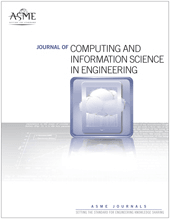
JOURNAL OF COMPUTING AND INFORMATION SCIENCE IN ENGINEERING
Fostering Interdisciplinary Collaboration for a Smarter TomorrowWelcome to the JOURNAL OF COMPUTING AND INFORMATION SCIENCE IN ENGINEERING, a premier publication from ASME that focuses on the dynamic intersection of computing and engineering disciplines. With an ISSN of 1530-9827 and E-ISSN 1944-7078, this journal serves as a critical platform for disseminating innovative research and advancements in areas such as Computer Graphics, Computer-Aided Design, Software Engineering, and Industrial Manufacturing. The journal spans from 2001 to 2024 and has been recognized for its excellence, boasting impressive Scopus rankings including Q1 in Industrial and Manufacturing Engineering and Q2 in both Computer Graphics and Computer Science Applications. It offers a unique opportunity for researchers, professionals, and students to engage with high-impact studies and present their contributions to a diverse audience. As a member of the esteemed ASME family, this journal promotes open dialogue and fosters the growth of knowledge in technical fields, while emphasizing practical applications and interdisciplinary collaboration. Join us in exploring the forefront of computing and engineering through rigorous research and insightful articles that drive innovation and progress.

BMC Chemistry
Elevating Chemical Science with Impactful ResearchBMC Chemistry, published by BMC, is a reputable open access journal that has made significant strides since its inception in 2019. Operating under e-ISSN 2661-801X, this journal is dedicated to advancing the field of general chemistry by promoting high-quality research across various sub-disciplines. Headquartered in the United Kingdom, BMC Chemistry boasts a commendable impact factor and is classified in Q2 within the prestigious field of Chemistry (miscellaneous) according to the 2023 category quartiles. The journal's Scopus ranking places it at #139 out of 408 in its category, highlighting its growing relevance and influence in the academic community, with a commendable 66th percentile standing. With a commitment to open access, BMC Chemistry ensures that groundbreaking discoveries and innovative research are available to a global audience, fostering collaboration and development in chemistry. Researchers, professionals, and students alike will find this journal to be an invaluable resource for disseminating knowledge and driving scientific advancement.
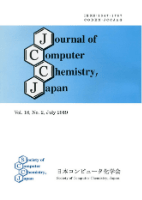
Journal of Computer Chemistry-Japan
Unveiling the Future of Chemistry through Computational InsightsJournal of Computer Chemistry-Japan, published by SOC COMPUTER CHEMISTRY, JAPAN, is a dedicated platform for researchers and professionals in the interdisciplinary fields of computational chemistry and chemical informatics. Though the journal does not currently provide open access, it maintains a rigorous selection process for contributions, ensuring the publication of high-quality, peer-reviewed research. With a focus on advancing computational methods and techniques to solve complex chemical problems, the journal aims to bridge the gap between theoretical chemistry and practical applications, making it an invaluable resource for academics and industry professionals alike. As the complexity of chemical systems continues to rise, the relevance of computational approaches in material science, drug discovery, and molecular modeling has never been more critical. Researchers are encouraged to engage with the contents of this journal, which showcases innovative studies, methodologies, and discussions relevant to the evolving landscape of computer-aided chemistry.
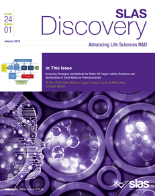
SLAS Discovery
Advancing the Frontiers of Life SciencesSLAS Discovery is a leading academic journal published by Elsevier Science Inc. that serves as a pivotal resource in the fields of Analytical Chemistry, Biochemistry, Biotechnology, and Molecular Medicine. Since its inception in 2017, the journal has become increasingly influential, attaining a Q1 ranking in Analytical Chemistry and notable Q2 rankings in the associated fields as of 2023. With an impressive Scopus rank that places it within the top percentile of its categories, SLAS Discovery highlights groundbreaking research and methodologies impacting drug discovery and development. The journal advocates for open access, ensuring that its curated content is widely available to the scientific community, fostering collaboration and innovation. Researchers, professionals, and students alike will find value in the journal's comprehensive reviews and original research articles that contribute to the advancement of scientific knowledge and applications in life sciences.

Green Chemical Engineering
Innovating chemical engineering for a sustainable future.Green Chemical Engineering, an esteemed journal published by KEAI PUBLISHING LTD, plays a pivotal role in advancing the field of sustainable chemical engineering. With an Open Access policy since 2020, this journal facilitates the free exchange of cutting-edge research and innovations that address critical environmental challenges. Based in China, it has rapidly gained recognition with impressive category quartiles, ranking Q1 in numerous relevant fields including Catalysis, Chemical Engineering (miscellaneous), Filtration and Separation, and Process Chemistry and Technology. Its presence in Scopus highlights its significance, with top rankings (e.g., Rank #4/19 in Filtration and Separation) placing it in the upper echelons of chemical engineering literature. Designed for researchers, professionals, and students alike, Green Chemical Engineering aims to foster a collaborative platform for the dissemination of pioneering work that contributes to a greener and more sustainable future.
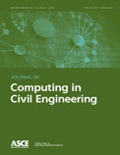
JOURNAL OF COMPUTING IN CIVIL ENGINEERING
Advancing the Future of Civil Engineering Through Computing.JOURNAL OF COMPUTING IN CIVIL ENGINEERING is a leading publication in the field of civil and structural engineering, with a specific focus on the application of computer science techniques in civil engineering projects. Published by the ASCE - American Society of Civil Engineers, this esteemed journal has been at the forefront of innovative research since its inception in 1987 and continues to maintain high academic standards with a remarkable impact factor. Achieving a prestigious Q1 ranking in both Civil and Structural Engineering and Computer Science Applications, it holds a commendable position within the top percentiles of Scopus ranks, at 94th and 91st respectively. The journal serves as a vital resource for researchers, practitioners, and students aiming to explore the integration of computational technologies and methodologies in civil engineering practices. By publishing cutting-edge research, it aims to advance knowledge and foster collaboration within the field, contributing significantly to the development of efficient, sustainable, and innovative engineering solutions.
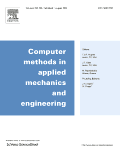
COMPUTER METHODS IN APPLIED MECHANICS AND ENGINEERING
Unveiling New Dimensions in Engineering through Computation.COMPUTER METHODS IN APPLIED MECHANICS AND ENGINEERING, published by Elsevier Science SA, is a premier journal that has significantly contributed to the fields of computational mechanics, computer science applications, mechanical engineering, and the mechanics of materials since its inception in 1972. With an ISSN of 0045-7825 and an E-ISSN of 1879-2138, this journal is recognized for its rigorous peer-review process and is consistently ranked in the Q1 quartile across multiple categories, including Computational Mechanics and Mechanical Engineering. Its impressive Scopus rankings place it in the top tiers of its field, with a percentile ranking of 98th in Computational Mechanics. Researchers, professionals, and students will find the journal's comprehensive scope and high-quality articles invaluable for advancing their knowledge and practices at the intersection of engineering and computation. Although not an open-access journal, its impactful contributions to both theoretical and applied research make it an essential resource for anyone involved in these dynamic fields.
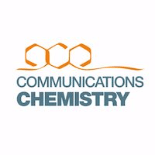
Communications Chemistry
Advancing the Frontiers of Chemical ResearchCommunications Chemistry is a premier open access journal dedicated to advancing the field of chemical sciences, published by NATURE PORTFOLIO. With an impactful presence since its inception in 2018, the journal has made significant strides, maintaining Q1 status in key categories including Biochemistry, Chemistry (Miscellaneous), Environmental Chemistry, and Materials Chemistry in 2023. Located in Berlin, Germany, this journal not only fosters interdisciplinary research but also emphasizes innovative and integrative approaches to chemical research. The journal is indexed in Scopus with commendable rankings, placing it in the 79th percentile for General Chemistry and Materials Chemistry. By offering a robust platform for the dissemination of high-quality research, Communications Chemistry plays an essential role in its community, engaging researchers, professionals, and students alike in exploring groundbreaking solutions and sustainable practices within the chemical sciences.

ARCHIVES OF COMPUTATIONAL METHODS IN ENGINEERING
Advancing Computational Solutions for Engineering Excellence.ARCHIVES OF COMPUTATIONAL METHODS IN ENGINEERING, published by SPRINGER, is a premier journal dedicated to advancing the fields of applied mathematics and computer science applications. With an impressive impact factor and a distinguished ranking of #5/635 in Applied Mathematics and #19/817 in Computer Science Applications as of 2023, this journal stands in the upper echelon of academic literature, evidenced by its classification in the Q1 category. Established in 1994 and running through to 2024, the journal serves as a vital platform for the dissemination of research that utilizes computational methods to solve complex engineering problems. Researchers, professionals, and students alike benefit from its rigorous peer-review process and high-quality articles, fostering innovation and collaboration within the computational engineering community. Although it does not offer Open Access, its insights are invaluable for those looking to stay at the forefront of engineering methodologies and computational advancements.

npj Computational Materials
Transforming Ideas into Advanced Material Solutions.npj Computational Materials is a premier open-access journal published by the esteemed NATURE PORTFOLIO since its inception in 2015, dedicated to advancing the interdisciplinary fields of computational materials science and engineering. With an impressively robust impact, the journal has achieved Q1 rankings across multiple disciplines, including Computer Science Applications, Materials Science, and Mechanics of Materials, making it a leading platform for disseminating innovative research. Researchers and professionals benefit from its high visibility and accessibility, given the open-access format that allows for a global reach. The journal continues to foster the development of computational methods and simulations that drive forward the design and deployment of advanced materials, positioning itself as an essential resource for academics and practitioners alike. By bridging the gap between theoretical models and practical applications, npj Computational Materials plays a crucial role in shaping the future of materials research.